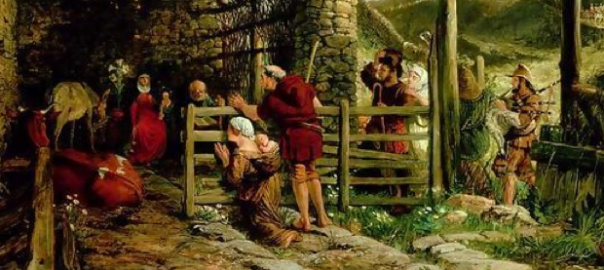
As we weather the coronavirus, we must be vigilant and wise, while retaining helpfulness to our neighbors and hopefulness to a world awash in fear. This is a moment to be thankful for local churches and charities as people under economic and emotional pressure experience the weight of very trying circumstances.
It is right to lament and repent for the moral scandals that often plague religious communities. Today’s 24/7 news cycle brings negative news with an immediacy that is jarring…and helps us forget all the good things that are happening through the efforts of millions of caring people, including people in our local churches.
In this essay, I want to recount some bright moments when the Church expressed her best virtues and served sacrificially, even when under great duress. Generosity is baked into the gospel and the mission of the Church. The Apostle Paul spent years evangelizing Jews and Gentiles – and he called upon the non-Jewish believers in Christ to sacrificially give toward their Jewish brothers and sisters suffering under a severe famine in Judea (Acts 11-20; 2 Corinthians 8-9). In addition to examples of Jesus and biblical texts extolling helping others, here are some heroic moments that can inspire us in our current situations:
249-250 AD: Emperor Decius declares an empire-wide assault on Christians, including demanding that they sacrifice to Caesar, and the destruction of buildings and libraries. At the same time, a serious plague came upon several places in the empire (coincidence?). The governors charged with carrying out this evil edict petitioned the Emperor and requested a delay in persecution. Why? Because it was Christians that were offering care and comfort to plague victims! Even under severe pressure, they were caring for all, enemy and friend alike.
440s and 450s: As Attila the Hun and other outsiders carve up the Western Roman Empire, it is the Church that maintains order and distributes food amidst the conquests. The Popes negotiated with the conquerors and ameliorated (in places) some of the atrocities and enable food to get to the populace.
6th and 7th centuries: The Benedictine Order and other monastic groups are doing much more than praying. They are establishing the first hostels for visitor, hospices for the dying, and rudimentary hospitals for the sick. They also add to the overall economy with sustainable agriculture, waterwheel technology and generosity.
12th-15th centuries: Long before the Reformation, Roman Catholic scholars are teaching the goodness of free trade and natural pricing in contrast to the mercantile controls governments often placed on goods. The University of Salamanca in Spain led the way in affirming what we now know as the principles of ethical free enterprise, in service of, “The brotherhood of Mankind.”
The Reformation (16th century): We see a leap forward in affirming “ordinary” work as equally important to God as “religious” labor. Without denigrating the importance of sacerdotal leadership, all Protestant streams affirm the priesthood of all believers (see Exodus 19:6 and I Peter 2:9-10), offering one’s daily efforts as worship before God. And this led to unprecedented expansions in charitable giving, entrepreneurship, and economic change.
In the next essay, we will examine the last five centuries of goodness through the Church, without sugarcoating the historical challenges. May we be inspired in our context toward creativity and innovation.

